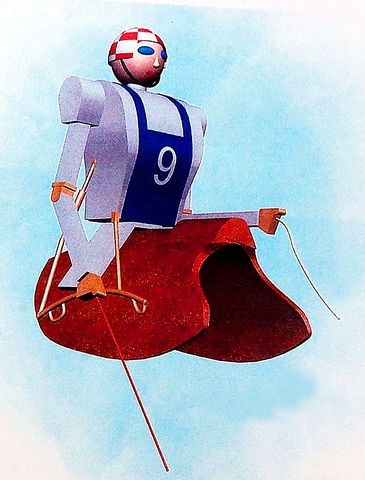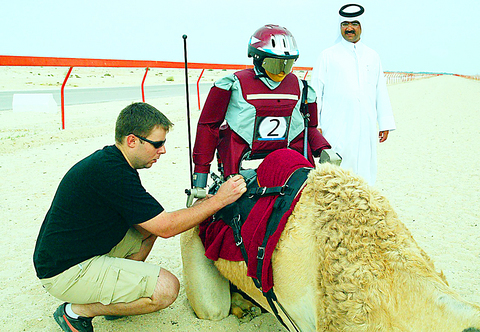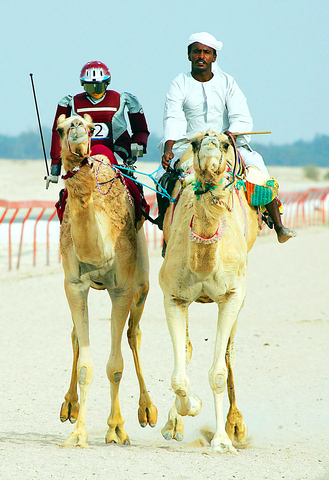On its first run round a Qatari camel-racing course, the robot jockey has set a time seconds off the record set by a child jockey, whose use in the popular sport has been banned after international criticism.
"We're 20 seconds away from the best time using a human jockey over 5km," said Alexander Colot, director of the Swiss firm K-team, which has built the robot jockey for Qatar.
The robot challenged its only competitor, a child jockey, over the 5km course on the Al-Shahaniya race track near Doha, while spectators and media watched, drawn to this unique event.

PHOTOS: AFP
Gulf Arab monarchies are trying to bring order to the sport in the face of protests over the trafficking of young children from developing countries, mostly in Asia, who become jockeys.
Human-rights groups raised alarm over the exploitation of children by traffickers who pay impoverished parents a paltry sum or simply kidnap their victims.
The children, mostly from Bangladesh, Sri Lanka and Pakistan, are then smuggled into the oil-rich Gulf states.

They are often starved by employers to keep them light and maximize their racing potential. Mounting camels three times their height, the children -- some as young as six -- face the risk of being thrown off and trampled.
Earlier this month, the United Arab Emirates (UAE) successfully completed its first robot-jockey exercise, with a ban on the use of jockeys aged under 16 and weighing less than 45kg also now in effect.
The UAE had in principle already banned the use of children under 15 since 1993, but abuses remain widespread and no one was ever prosecuted.

PHOTOS: AFP
In December, Qatar banned the use of children in camel races and said it was preparing to use robot jockeys from 2005.
Mounted on a racing camel, which has an average speed of 40kph, the remote-controlled robot jockey displays remarkably similar gestures to those of a human jockey, even whipping the camel to make it go faster.
After "about 30 attempts" since launching the idea in April 2004, "the product is now ready," said Colot.
Property rights for the robot have been registered for Qatar.
"No one can manufacture [a robot] without the authorization of Qatar," said Rashed Ali Ibrahim, a member of the Qatari committee charged with promoting robot jockeys.
According to Colot, "the Emirati model (resembles) a doll rather than a robot."
Doha is increasingly set on developing its own robot jockey, "notably with a movement of arms and battery-powered," said committee president Sheikh Abdullah bin Saud al-Thani, who announced a plan to create "a factory for robot jockeys" in the gas-rich Gulf state.
"We hope to introduce around 20 robot jockeys" next year at Qatar's annual grand prix, he said.
While the Swiss manufacturer refuses to reveal the cost of the project, Sheikh Abdullah said, "the first phase involved investments of some 3 million riyals (US$800,000)."
"This experiment can succeed and be generalized," said Fredj Fenniche, regional representative for the UN Human Rights Commission.
"Our way seeks to make Qatar a state of law and respect of human rights, and we won't tolerate going against this," said Sheikh Hamad bin Jassim bin Faisal al-Thani, president of the organizing committee for camel races in Qatar.

In Taiwan there are two economies: the shiny high tech export economy epitomized by Taiwan Semiconductor Manufacturing Co (TSMC, 台積電) and its outsized effect on global supply chains, and the domestic economy, driven by construction and powered by flows of gravel, sand and government contracts. The latter supports the former: we can have an economy without TSMC, but we can’t have one without construction. The labor shortage has heavily impacted public construction in Taiwan. For example, the first phase of the MRT Wanda Line in Taipei, originally slated for next year, has been pushed back to 2027. The government

July 22 to July 28 The Love River’s (愛河) four-decade run as the host of Kaohsiung’s annual dragon boat races came to an abrupt end in 1971 — the once pristine waterway had become too polluted. The 1970 event was infamous for the putrid stench permeating the air, exacerbated by contestants splashing water and sludge onto the shore and even the onlookers. The relocation of the festivities officially marked the “death” of the river, whose condition had rapidly deteriorated during the previous decade. The myriad factories upstream were only partly to blame; as Kaohsiung’s population boomed in the 1960s, all household

Allegations of corruption against three heavyweight politicians from the three major parties are big in the news now. On Wednesday, prosecutors indicted Hsinchu County Commissioner Yang Wen-ke (楊文科) of the Chinese Nationalist Party (KMT), a judgment is expected this week in the case involving Hsinchu Mayor Ann Kao (高虹安) of the Taiwan People’s Party (TPP) and former deputy premier and Taoyuan Mayor Cheng Wen-tsan (鄭文燦) of the Democratic Progressive Party (DPP) is being held incommunicado in prison. Unlike the other two cases, Cheng’s case has generated considerable speculation, rumors, suspicions and conspiracy theories from both the pan-blue and pan-green camps.

Stepping inside Waley Art (水谷藝術) in Taipei’s historic Wanhua District (萬華區) one leaves the motorcycle growl and air-conditioner purr of the street and enters a very different sonic realm. Speakers hiss, machines whir and objects chime from all five floors of the shophouse-turned- contemporary art gallery (including the basement). “It’s a bit of a metaphor, the stacking of gallery floors is like the layering of sounds,” observes Australian conceptual artist Samuel Beilby, whose audio installation HZ & Machinic Paragenesis occupies the ground floor of the gallery space. He’s not wrong. Put ‘em in a Box (我們把它都裝在一個盒子裡), which runs until Aug. 18, invites